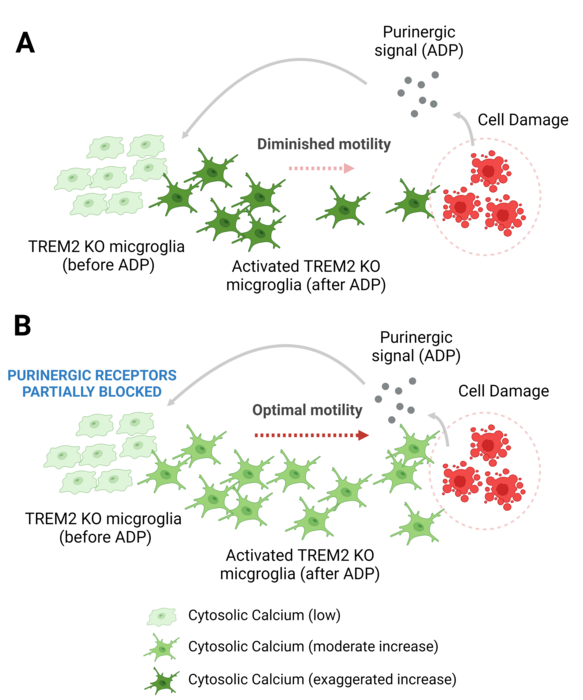Irvine, Calif., March 23, 2022 — The molecular processes caused by a TREM2 (Triggering Receptor Expressed on Myeloid Cells 2) gene mutation in the brain’s microglia immune cells can increase the risk of Alzheimer’s disease, according to a recent study led by researchers at the University of California, Irvine. While many immune cell genes have been associated with Alzheimer’s, the odds are increased two to three times by mutations in TREM2. However, the processes by which these mutations change the function of microglia cells have not been identified until now.

Credit: School of Medicine / UCI
Irvine, Calif., March 23, 2022 — The molecular processes caused by a TREM2 (Triggering Receptor Expressed on Myeloid Cells 2) gene mutation in the brain’s microglia immune cells can increase the risk of Alzheimer’s disease, according to a recent study led by researchers at the University of California, Irvine. While many immune cell genes have been associated with Alzheimer’s, the odds are increased two to three times by mutations in TREM2. However, the processes by which these mutations change the function of microglia cells have not been identified until now.
The study, titled “TREM2 regulates purinergic receptor-mediated calcium signaling and motility in human iPSC-derived microglia” was recently published online in eLife.
A critical function of microglia is restoring brain health. Building on their earlier work showing microglia that lack TREM2 have problems moving toward sites of damage in the brain, the team discovered that this lack of motility is associated with increased levels of P2RY12 and PRY13 receptors on the microglia. When these receptors detect purinergic molecular danger signals released from nearby damaged cells, they rapidly increase internal messenger calcium within the microglia. The microglia containing higher calcium levels don’t turn as frequently and so can’t direct themselves to the sites of injury.
“Our study shows that problems arise from having too much signaling between P2RY12 and P2RY13 receptors. We were able to return the microglia immune cells back to their normal function by blocking these receptors. This suggests that Alzheimer’s patients who have mutations in the TREM2 protein would benefit from inhibition of these receptors or related signaling molecules. Manipulating calcium using drugs could be another way to modulate microglia behavior to fight disease,” said Michael D. Cahalan, PhD, Physiology & Biophysics distinguished professor and chair at the UCI School of Medicine, and co-corresponding author.
The team used a culture model of microglia derived from human induced pluripotent stem cells from blood to study the lack of TREM2. A special calcium probe called Salsa6f was engineered into those cells, which allowed calcium to be measured while recording motility characteristics in real time.
“Alzheimer’s disease is the most common cause of dementia and currently has no cure,” Cahalan said. “Studies of DNA from people with Alzheimer’s surprisingly revealed that changes to genes in microglia can have a great impact on whether or not someone gets the disease. Understanding the processes of how these mutations change immune cell function will allow us to develop targeted therapies.”
UCI post doctoral scholar Amit Jairaman, and graduate student Amanda McQuade, who is now a postdoctoral fellow at UCSF, are co-first authors of the study.
This research was supported by the National Institutes of Health under Award Numbers R01 NS14609, R01 AI121945, R01 AG048099, R01 AG056303, R01 AG055524, core AG066519, U01 AI160397, T32 NS082174, RF1DA048813, and AG059236-01A1; National Research Foundation Award Numbers 2020 M3C7A1023941, and I21SS7606036; a UCI Sue & Bill Gross Stem Cell Research Center Seed Grant; and a gift from the Susan Scott Foundation.
About the UCI School of Medicine: Each year, the UCI School of Medicine educates more than 400 medical students, and nearly 150 doctoral and master’s students. More than 700 residents and fellows are trained at UCI Medical Center and affiliated institutions. The School of Medicine offers an MD; a dual MD/PhD medical scientist training program; and PhDs and master’s degrees in anatomy and neurobiology, biomedical sciences, genetic counseling, epidemiology, environmental health sciences, pathology, pharmacology, physiology and biophysics, and translational sciences. Medical students also may pursue an MD/MBA, an MD/master’s in public health, or an MD/master’s degree through one of three mission-based programs: the Health Education to Advance Leaders in Integrative Medicine (HEAL-IM), the Leadership Education to Advance Diversity-African, Black and Caribbean (LEAD-ABC), and the Program in Medical Education for the Latino Community (PRIME-LC). The UCI School of Medicine is accredited by the Liaison Committee on Medical Accreditation and ranks among the top 50 nationwide for research. For more information, visit som.uci.edu.
Journal
eLife
DOI
10.7554/eLife.73021.sa0
Method of Research
Observational study
Subject of Research
Lab-produced tissue samples
Article Title
TREM2 regulates purinergic receptor-mediated calcium signaling and motility in human iPSC-derived microglia
Article Publication Date
22-Feb-2022
COI Statement
Sunil Gandhi is a co-founder of NovaGlia, Inc.
Mathew Blurton-Jones is a co-inventor of patent application WO/2018/160496, related to the differentiation of pluripotent stem cells into microglia. Is a co-founders of NovoGlia Inc




